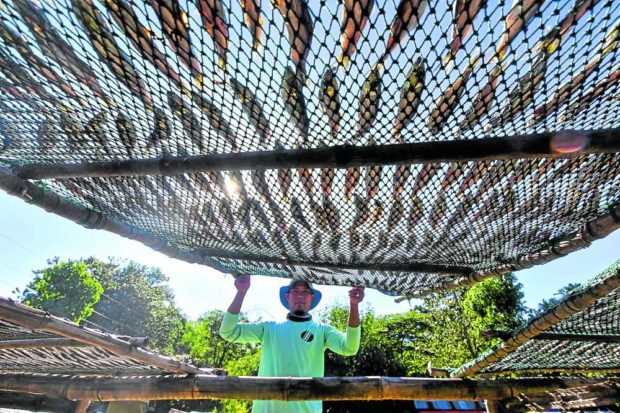
DRYING OUTSIDE A trader in Sual, Pangasinan, makes sure that nothing will go to waste as he sun-dries excess fish from his stock near the town wharf. The fish are caught in Lingayen Gulf and in the waters off the western coastline of Pangasinan. —WILLIE LOMIBAO
MANILA, Philippines — Industry stakeholders are seeking a congressional inquiry into the Department of Agriculture’s (DA) decision to allow the entry of more imported fish as local supply won’t be sufficient to meet the demand for the first quarter of this year.
At an online briefing on Monday, fishers’ groups have expressed their opposition against the recent move to allow more fish importation.
“We implore Congress or the Senate to have a hearing regarding fish importation. We want to know DA’s justification for allowing this CNI (certificate of necessity to import),” said Dennis Calvan of Pangingisda Natin Gawing Tama Panagat Network.
Peter Paul Santos, vice president for the National Capital Region of Alliance of Philippines Fishing Federation Inc., is appealing to the government to recall the CNI as this would jeopardize local production, adding that municipal fisherfolk and the aquaculture sector will suffer if there is oversupply.
Importation should not be the government’s first recourse when anticipating deficiency in fish supply due to closed fishing season or natural calamities.
“There should be research. There should be a study on how to mitigate those disasters without resorting to importation,” Calvan said.
Both Philippine Tilapia Stakeholders Association president Jon Juico and Taal Lake Aquaculture Alliance Inc.’s Mario Balazon said that instead of relying on data alone, policymakers should visit the fishers and look at the real situation on the ground.
Legarda warning
Agriculture Secretary William Dar said last week he had authorized the importation of 60,000 metric tons of small pelagic fishes to cover half of the estimated shortage in local supply in the first quarter.
Dar previously said the importation was meant to stabilize supply and keep prices in the wet markets from rising as local supply was yet to normalize following the devastation brought about by Typhoon “Odette” (international name: Rai) on many fishing areas late last year.
Deputy Speaker Loren Legarda, for her part, on Monday warned that the government’s plan to import 60,000 MT of fish in the first quarter of this year would further marginalize many small-scale fishers in the country.
Legarda said the DA must first address the concerns of the public, particularly the allegations that there was sufficient supply from the previous imports still unsold that could sustain the country’s needs and that previous imports have had little or no impact on fish prices.
Wrong DA priorities
“We risk further marginalizing many of our small-scale fishers and coastal communities who are already vulnerable to a myriad of social and environmental changes. These policy decisions that tend to further bring down our most marginalized sectors must be based on evidence,” she said in a statement.
But Sen. Cynthia Villar said on Monday that the country was facing a shortage of fish, while the livelihood of many Filipino fisherfolk was under threat mainly due to the failed implementation of programs and the supposedly wrong priorities of the DA and the BFAR.
During the hearing of the Senate committee on agriculture which she chairs, Villar blasted the DA for supposedly refusing to listen to the pleas of the fisherfolk community, and has instead resorted to importation as the quick-fix solution to the country’s dwindling fish supply.
She called out Eduardo Gongona, director of the BFAR, for the bureau’s failure to implement the establishment of 37 fish hatcheries since 2016, which, she said, could have helped the country attain food sufficiency on fish.
“Three bills are now pending in the plenary, and we have these 11 more that are about to be enacted. But what is the use of passing so many laws if they are not implemented?” she said. INQ